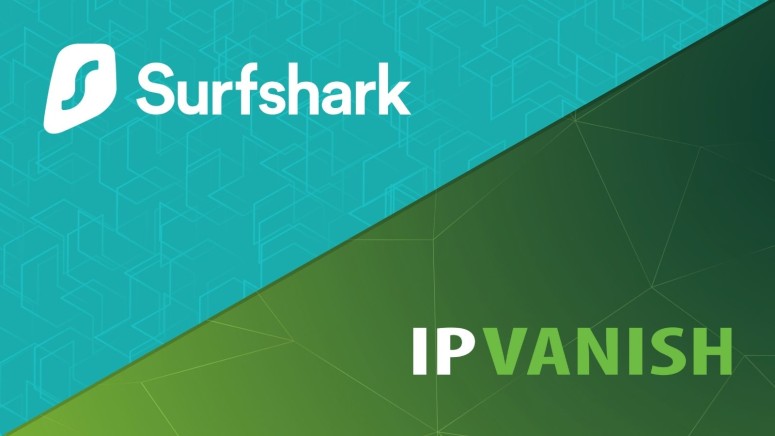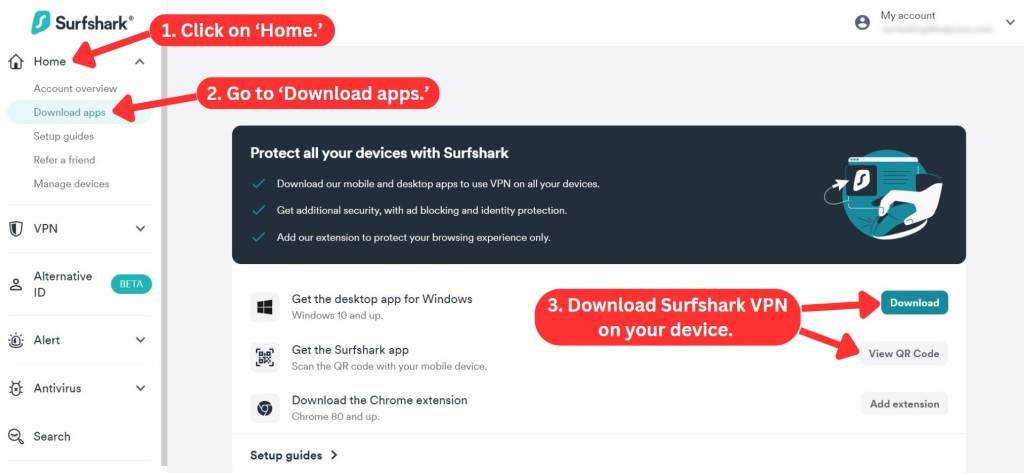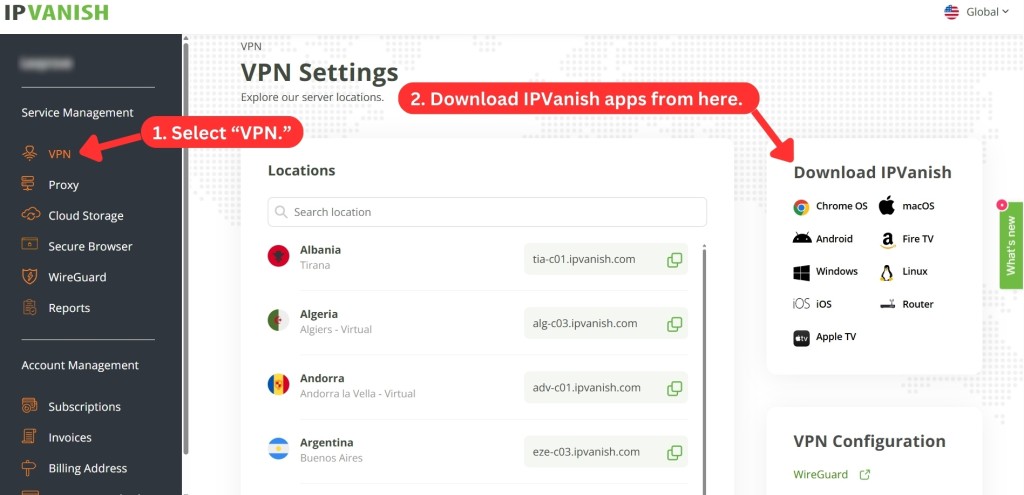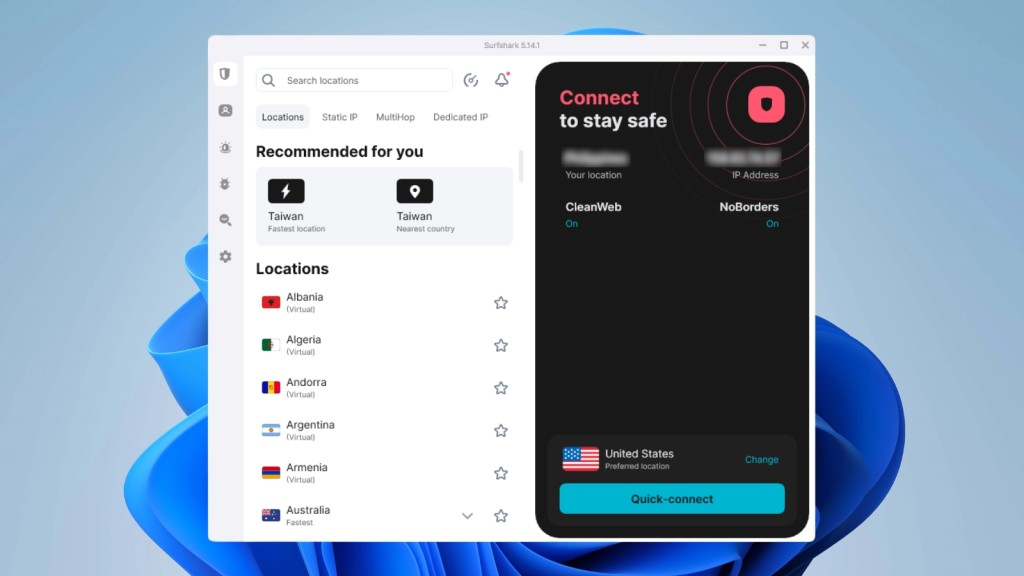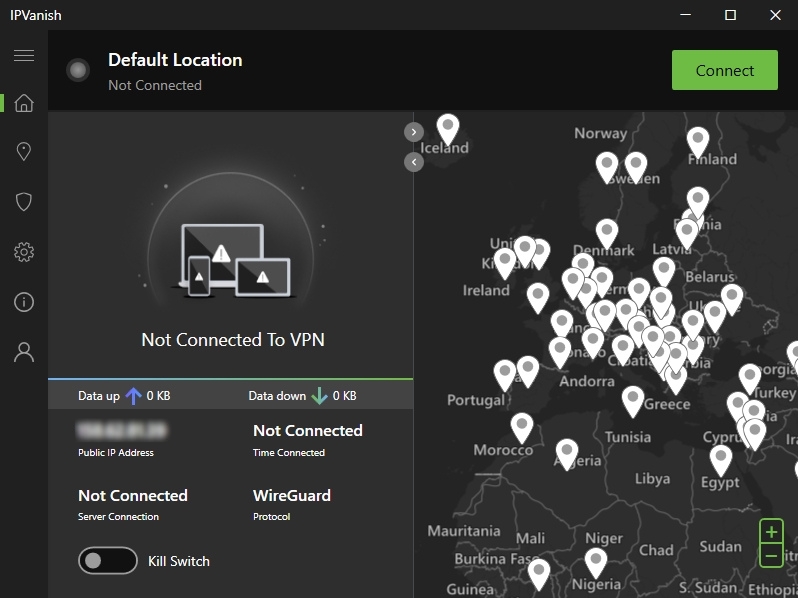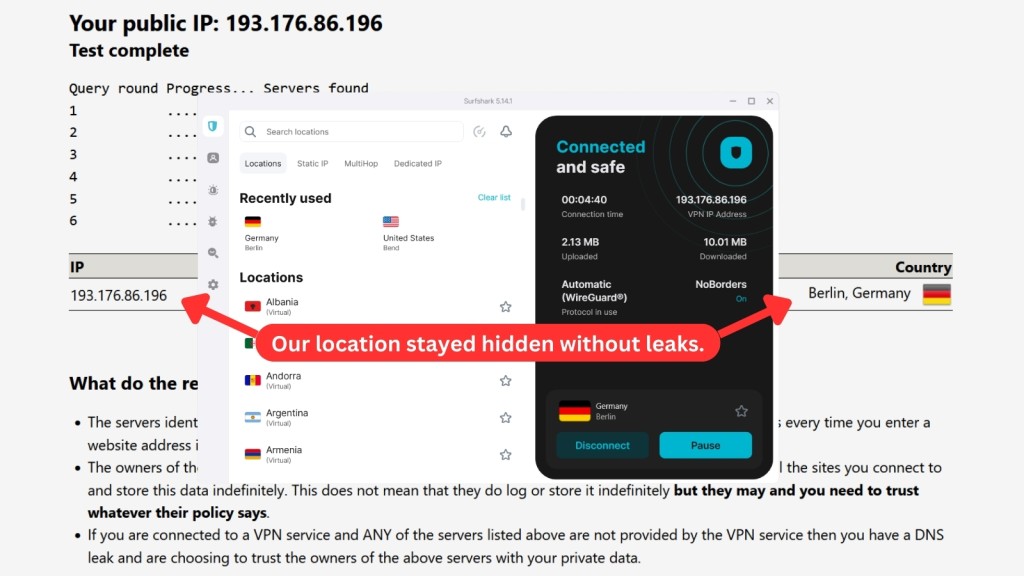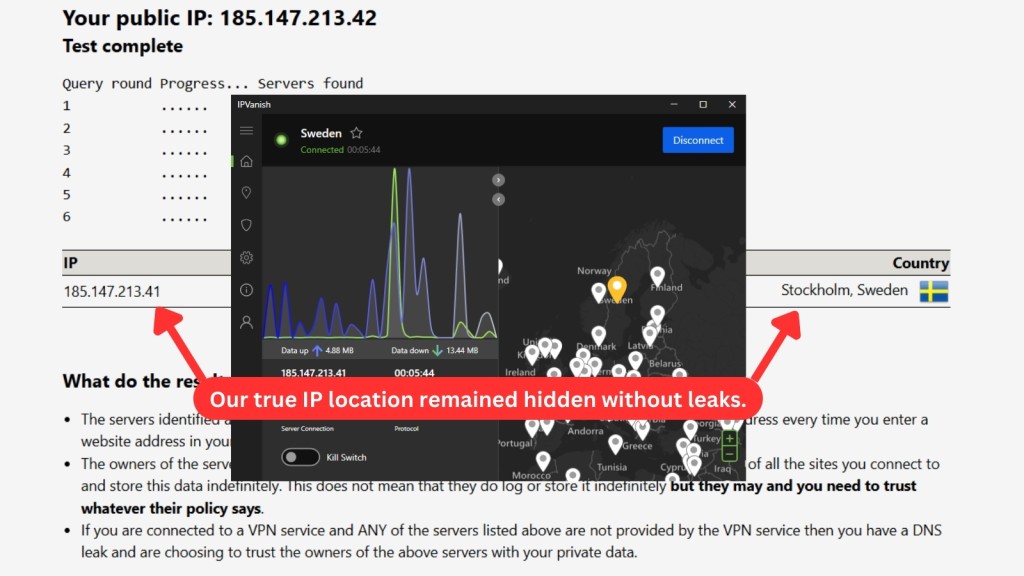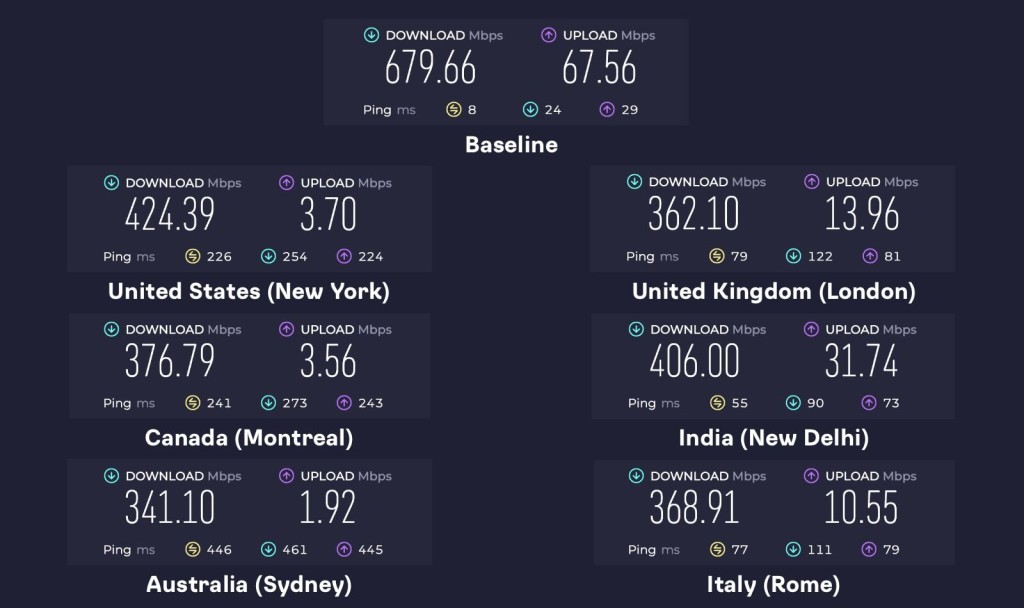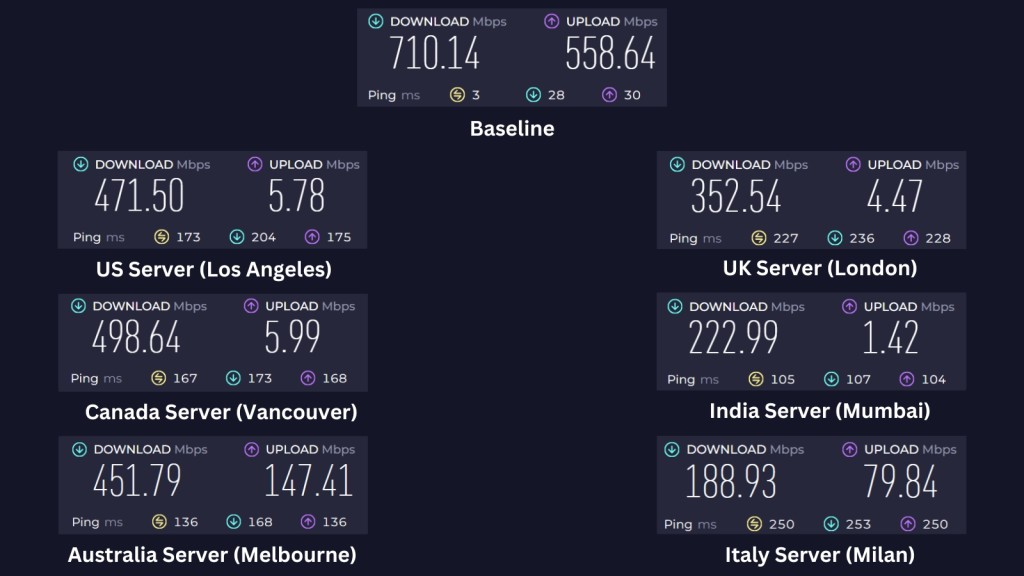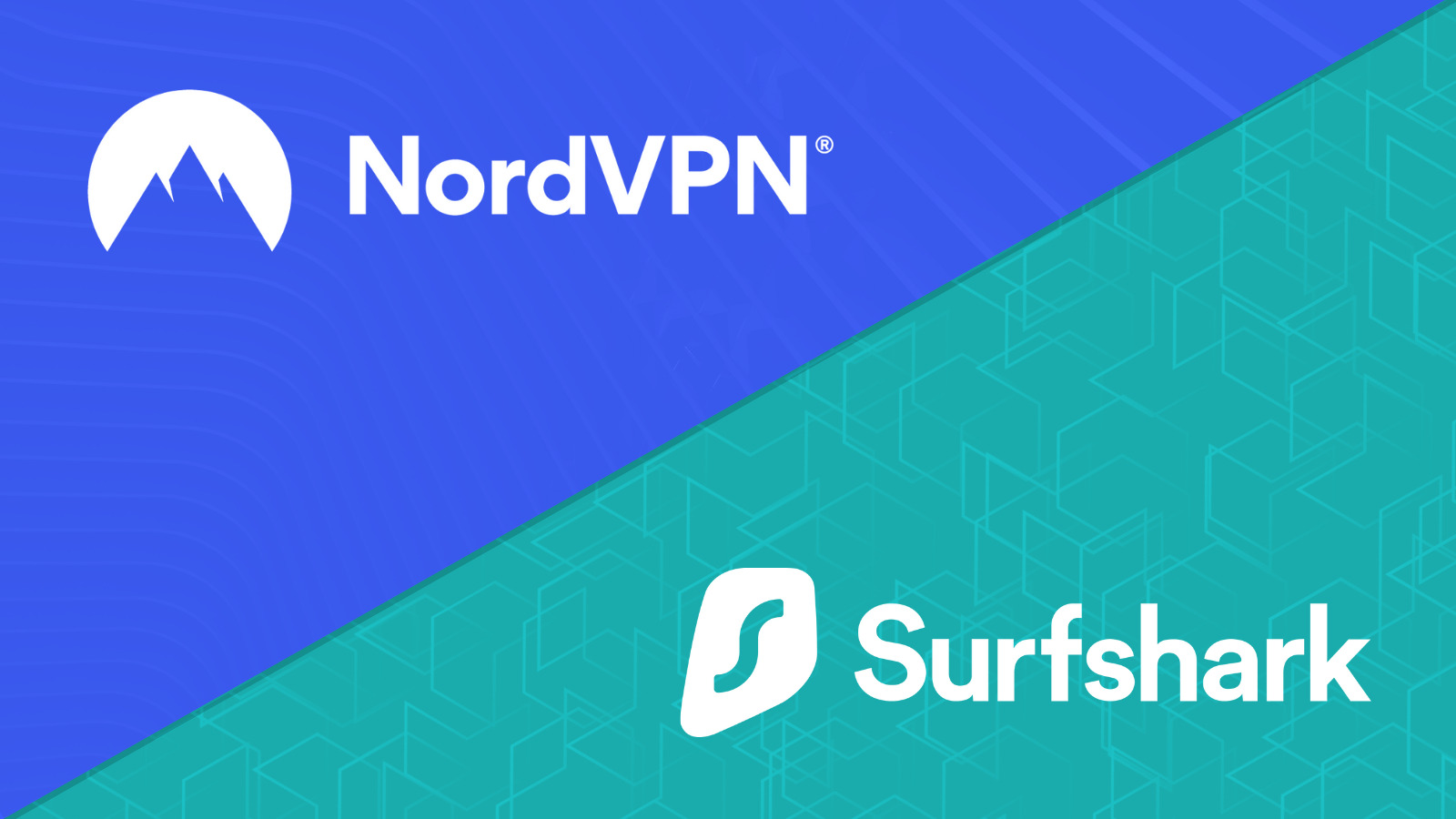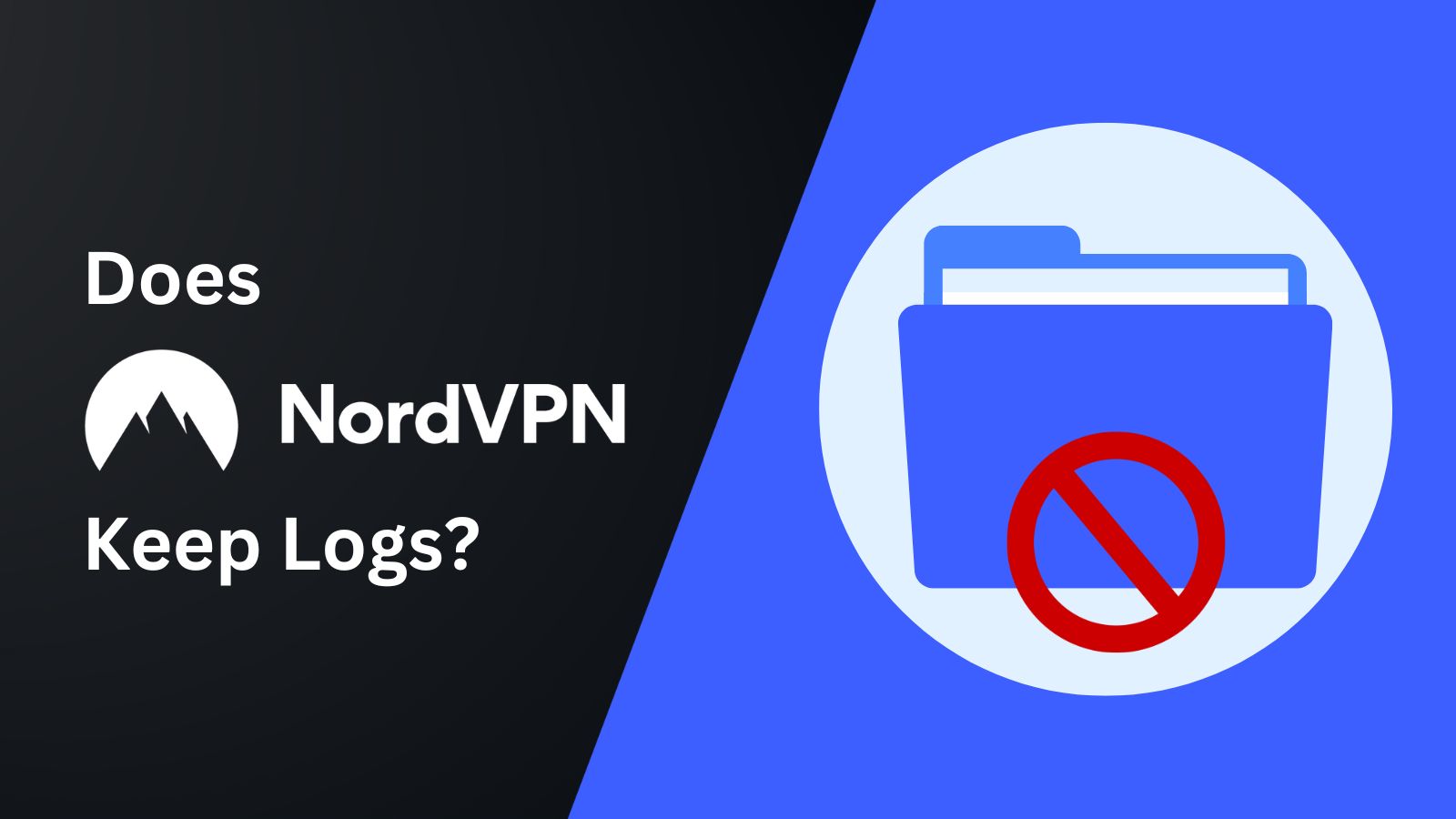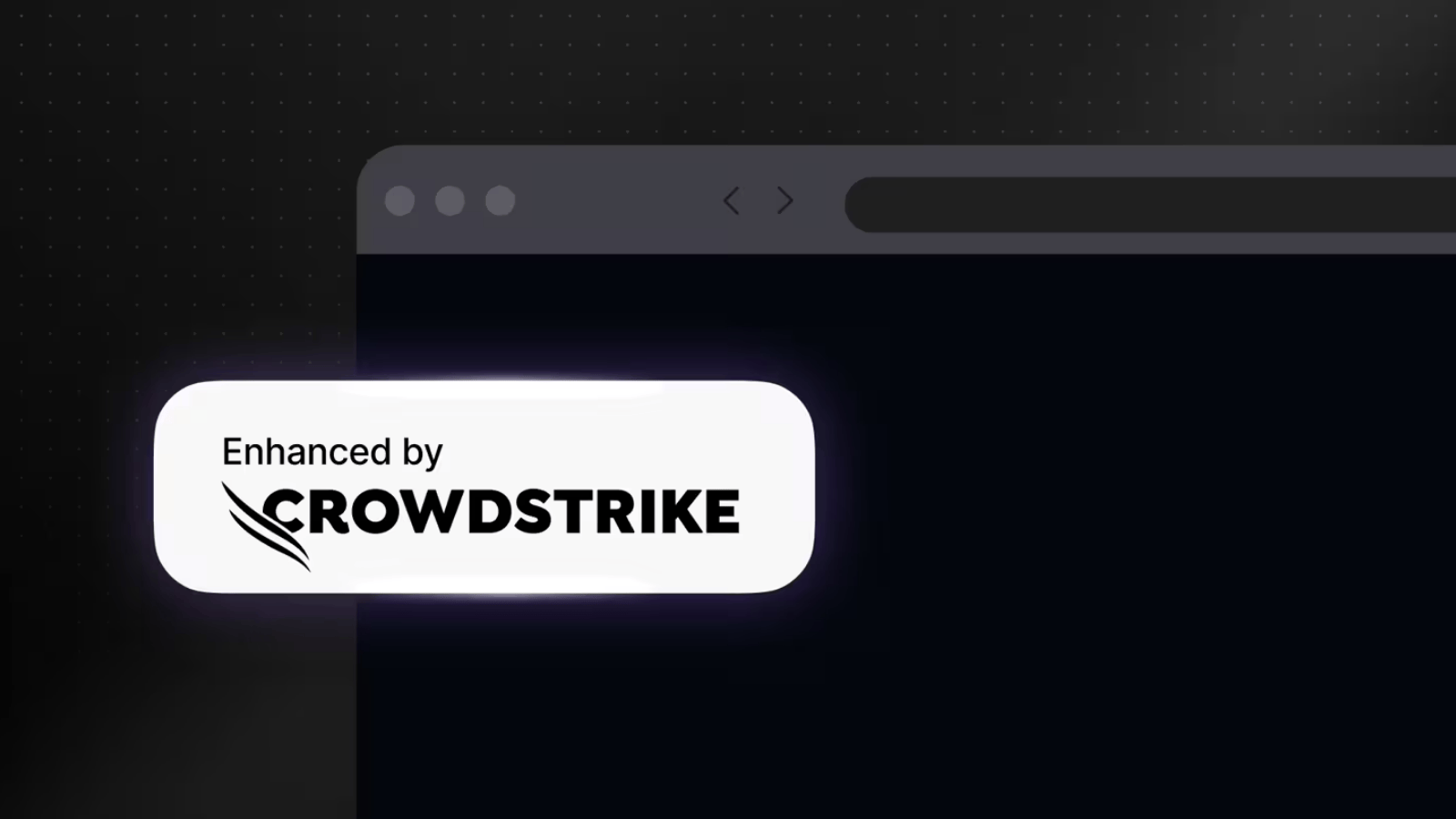When you purchase through links on our site, we may earn an affiliate commission. Here’s how it works.
Surfshark vs. IPVanish 2026
Our experts have reviewed 53 VPN providers, which were put through extensive rounds of testing. To learn more about that process, here’s how we review VPNs, where we explain our criteria and our policy of being fully transparent.
Surfshark and IPVanish are reliable VPN options, and it’s no surprise that they consistently appear in our top VPN list. The two services share a lot in common, but this Surfshark vs IPVanish comparison takes a closer look to determine which VPN reigns supreme.
Based in the Netherlands since 2018, Surfshark quickly made a name for itself with its stringent no-logs policy and unlimited device connections. It’s a versatile option that’s ideal for security-focused users and streaming enthusiasts alike.
In contrast, US-based IPVanish brings over a decade of experience since 2012. Despite past transparency concerns, it now operates under a no-logs promise and supports streaming and torrenting without dedicated servers for these activities.
But can this provider match up to the rapidly rising Surfshark? Before we uncover a definitive answer, here’s an overview of what each VPN provides.
Aside from the basics, we’ll also have a comprehensive analysis of each aspect to determine the right VPN for your needs.
We’ll explore essential decision metrics, including backgrounds, protocols, speed, media streaming, gaming support, torrenting capabilities, pricing, and more, to crown a champion.
Background, Jurisdiction & Reputation
A VPN’s country of origin and its legal standing are foundational elements in assessing its reliability. Ideally, you should avoid using a service originating from any of the 5/9/14-Eyes Alliance due to mandatory data retention laws. This segment of our IPVanish vs Surfshark comparison investigates these aspects and the trust they've cultivated.
Surfshark - (Score 9/10)
Surfshark, founded by Vytautas Kaziukonis, was launched in 2018 in the British Virgin Islands. However, the service has now moved its headquarters to the Netherlands, which is part of the 5/9/14-Eyes Alliance. Despite this, the Netherlands has strong domestic privacy laws similar to the EU’s GDPR that restrict data retention.
Surfshark became part of Nord Security in 2022 through a merger, joining the same group that owns other well-known VPN brands like NordVPN and the now-defunct Atlas VPN. However, Surfshark continues to operate as an independent entity with its own development roadmap and resources.
Plus, Surfshark has never suffered a data breach or leak. It has also undergone multiple independent audits to verify its no-logs commitment and infrastructure security. To further bolster its privacy claims, Surfshark employs RAM-only servers, meaning no user data touches the hard drive. This adds an extra layer of protection to its strict no-logs policy.
IPVanish - (Score 7/10)
IPVanish was launched in 2012 by Mudhook Media and is currently owned by NetProtect. It’s a Ziff Davis brand that also owns several other VPN services, like StrongVPN and WLVPN. Despite sharing ownership, each VPN maintains separate product roadmaps, privacy policies, and security infrastructure.
In 2016, IPVanish shared some user information with authorities during a criminal investigation despite marketing itself as a zero-logs VPN. The incident damaged its reputation, but the service now fully complies with a strict no-logs promise under the new ownership.
As a US-based company, though, IPVanish is subject to surveillance laws as part of the 5/9/14-Eyes Alliance. Unlike Surfshark, it lacks privacy-focused RAM-only servers and relies on hard drive storage instead. However, IPVanish undergoes regular independent audits to validate its commitment to data privacy and security.
Who’s the Winner? - Surfshark!
Surfshark's relocation to the Netherlands, despite its 5/9/14-Eyes status, is offset by stringent local privacy laws and additional security measures like RAM-only servers - safeguards that IPVanish lacks. If you prioritize a secure and private online experience, we recommend you get Surfshark. It has no past incidents and offers solid protection for your data.
Supported Platforms & Devices
Compatibility across multiple devices and platforms is crucial for VPN users. In this section, we'll explore the cross-platform functionality offered by Surfshark and IPVanish. Let’s see how they cater to this diverse digital landscape.
Surfshark - (Score 10/10)
Surfshark covers essential devices like laptops and smartphones with native apps for Windows, macOS, iOS, Android, and Linux systems. The provider goes beyond traditional apps by offering extensions for Chrome, Firefox, and Edge browsers.
For entertainment devices, Surfshark has a native app for Apple TV HD (including 4K models), Android TV, and Fire TV. However, you'll need a router with VPN installed for Roku, older Chromecast models, and gaming consoles like Xbox and PlayStation. This ensures comprehensive protection for all devices on your network.
Moreover, Surfshark lets you protect all your devices by offering unlimited simultaneous connections on just one account.
IPVanish - (Score 8/10)
IPVanish supports all major operating systems, including Windows, Mac, iOS, Android, ChromeOS, and Linux. However, it lacks browser extensions, which means you’ll miss out on plugin-based protection while surfing the Internet.
Alongside the desktop and mobile apps, IPVanish caters to streaming devices as well. It offers native apps for Android TV, Amazon Fire TV, and Apple TV to integrate protection for streaming enthusiasts.
Like Surfshark, IPVanish supports unlimited simultaneous connections with a single account. It also provides setup guides for router-based VPN configuration to ensure network-wide protection. If you seek further convenience, IPVanish offers pre-configured routers through a partnership with FlashRouters.
Who’s the Winner? - Surfshark!
Both IPVanish and Surfshark let you connect unlimited devices, but Surfshark is available on more platforms and even offers browser extensions. If you're after versatility, get Surfshark to cover all your digital needs.
Installation & Initial Configuration
A VPN should aim for a user-friendly approach facilitated by native apps that require minimal setup. So, let’s see how the two services compare in this Surfshark vs. IPVanish segment.
Surfshark - (Score 10/10)
Signing up for Surfshark is simple and quick. It starts with subscribing via its official website and then downloading the VPN app for your specific device or platform. Surfshark’s apps are also available across all popular app stores to ensure easy access.
The installation wizard provides simple on-screen prompts that guide you through the VPN setup. Within minutes, you can connect to a VPN server or customize advanced settings if desired.
You also get alternative download links to access the platform clients in restricted regions where the main site is banned or blocked. For routers and manual configuration, Surfshark provides detailed guides to walk you through the steps.
IPVanish - (Score 10/10)
Getting started with IPVanish is straightforward, even for complete beginners. After purchasing a subscription at the official website, you can quickly download and install the VPN app on your chosen device by following the on-screen instructions.
Like Surfshark, you can find IPVanish apps on the iOS App Store and Google Play Store. Once installed, you can instantly activate protection with a few clicks through IPVanish’s global server network.
For routers and streaming devices, IPVanish provides manual setup guides and detailed tutorials to facilitate connections. So, you've got multiple options to secure your connection, whether through native VPN clients or guided device installations.
Who’s the Winner? - It’s a Tie!
It’s hard to choose a winner in this round, as both Surfshark and IPVanish exhibit quick and straightforward app installation across various devices. So, get Surfshark if you want a quick setup paired with wide platform support and helpful guides. Or get IPVanish if you prefer a simple configuration right out of the box.
Prominent Features
In a crowded market, distinctive features can make a VPN stand out. This section of our comprehensive Surfshark vs. IPVanish comparison dives into the features of Surfshark and IPVanish, highlighting what sets them apart and helps them deliver quality service.
Surfshark - (Score 9/10)
Surfshark delivers all the essential privacy protection features, including an automated kill switch and robust protection against DNS, IPv6, and WebRTC leaks. The provider also offers industry-standard VPN protocols like WireGuard, IKEv2, and OpenVPN along with AES-256-GCM (OpenVPN and IKEv2), ChaCha20 (WireGuard), and Post-Quantum Encryption (WireGuard) encryption algorithms to protect your traffic.
Additionally, you get split tunneling functionality, called Bypasser (recently launched for macOS too), that lets you decide which apps route through the VPN tunnel and which ones utilize the local connection. For double VPN protection, the 'MultiHop' feature chains your connection through multiple server locations. Then there’s a built-in ad and malware blocker called 'CleanWeb' that filters content for safer browsing.
On top of that, it’s got a few premium privacy tools we don’t see every day. 'Alternative ID' helps you create a new digital identity, 'Camouflage Mode' uses OpenVPN-based obfuscation to hide VPN traffic, and dedicated IPs are available as an add-on for reliable access to IP-restricted services. Surfshark also supports unlimited server switching and doesn’t have any data or bandwidth caps.
IPVanish - (Score 7.5/10)
IPVanish offers all the core VPN functionality, making it a good option for most users. It provides an automatic kill switch for Windows, Mac, iOS, Android, and Fire TV devices. IPVanish further enhances your experience with its IP/DNS leak protection, safeguarding your browsing activities from potential exposure.
It supports OpenVPN, IKEv2, IPSec, and WireGuard protocols. IPVanish also uses AES-256-CBC with a SHA256 hash algorithm and ChaCha20 VPN encryption to ensure your data remains secure. And like Surfshark’s CleanWeb, you get a 'Threat Protection' feature to block harmful content, as well as the 'Double Hop' option, which routes your traffic through two VPN servers for extra encryption.
Moreover, IPVanish provides split tunneling for Windows, Mac, Android, and iOS, including Fire OS and Apple Vision Pro devices. It stands out with its SOCKS5 proxy and supports unrestricted data and bandwidth usage with unlimited server switching. However, it lacks dedicated IP addresses and focuses on shared IP configurations for anonymity.
Who’s the Winner? - Surfshark!
IPVanish and Surfshark both offer advanced features like obfuscation, threat protection, and double VPN servers. But Surfshark goes further with useful extras like generating an alternative online identity and offering dedicated IPs for more consistent access. If you want more control, more privacy, and just more to work with, get Surfshark.
Server Count & Infrastructure
The size and quality of a VPN's server network can significantly impact its performance. Let's delve into the server infrastructure of Surfshark and IPVanish, comparing their global reach and accessibility.
Surfshark - (Score 9/10)
Surfshark maintains an extensive network of 4,500+ servers in 100 countries, making it one of the top VPNs with the widest server distribution across countries. All servers also operate on 10Gbps connections and feature a RAM-only architecture, ensuring your data is wiped clean every time the server reboots.
Surfshark doesn’t use labels to identify servers for streaming, gaming, or torrenting. Still, they confirm that all of their servers are optimized for P2P activities, giving you a wide selection for file sharing.
In addition to physical servers, Surfshark also offers virtual servers. These provide even more location options and are clearly marked as 'Virtual' for full transparency.
IPVanish - (Score 9/10)
IPVanish offers a dedicated network of 2,400+ servers in 100+ countries. Although IPVanish doesn’t have specialized server offerings, its network is well-suited for a range of online activities, including secure browsing, gaming, and P2P file sharing.
Previously, IPVanish mainly focused on physical servers, but now they've expanded to include over 50 virtual server locations, so you'll have plenty of connection options. However, IPVanish lacks RAM-only servers, making it a less secure option compared to Surfshark.
Despite this, you get unique features like 'Scramble' that can hide your OpenVPN traffic. With this feature, you can connect to thousands of obfuscated servers and access content in countries that block VPN traffic.
Who’s the Winner? - It’s a Tie!
IPVanish and Surfshark bring something valuable to the table, and the better pick really depends on what you care about most. Get Surfshark if you want that extra edge in speed and security backed by a powerful server network. But if solid obfuscation with a flexible setup is enough, get IPVanish instead.
UI/UX Design & Ease of Use
A smooth VPN experience relies heavily on a user-friendly interface and overall user experience. In this section of the comparison, we'll assess the design principles and ease of use of both VPNs to determine how they compare.
Surfshark - (Score 9/10)
Surfshark features a user-friendly interface that emphasizes straightforward navigation and quick access to all essential features. The home screen on the Windows app showcases a 'Quick-connect' button to automatically connect to the nearest or fastest server location.
On the left-hand side, you can search locations or connect to recently used servers for added convenience. Below the search box, you can find MultiHop, Static IP, and Dedicated IP options.
The left side of the interface is also where you’ll find useful features like Surfshark Alert and Antivirus, including Alternative ID. It also houses the 'Settings' panel where you modify the app’s appearance, activate crucial features like CleanWeb and kill switch, and more.
Surfshark delivers an equally refined experience on mobile platforms. You can connect to the nearest server by tapping the blue-green ribbon at the bottom and accessing settings via the cogwheel icon to customize your connection.
IPVanish - (Score 8/10)
IPVanish provides a polished desktop interface that’s designed with efficiency in mind. The home screen features a green "Connect" button in the top right corner. This button instantly connects you to the fastest server based on your location, making it super easy to secure your connection.
The desktop app shows a dynamic real-time graph that tracks and exhibits essential metrics like your public IP address, server connection details, and speed. The Windows app also displays a kill switch button below the graph.
The right side of the home screen features a clickable map with all the VPN’s locations. You can access account information or delve into settings from the navigation menu on the left side of the screen. Here, you can fine-tune your VPN settings or adjust preferences to your specific needs.
The mobile apps use the same design language and provide a similar navigation experience. They mirror the desktop’s core functionalities but aren’t the most polished apps in terms of UI/UX design.
Who’s the Winner? - Surfshark!
Surfshark wins this round with a well-designed, user-friendly interface that makes navigation easy for everyone. That means if you get Surfshark, you'll get quick access to essential features without any fuss. IPVanish isn’t far behind, though. But Surfshark’s overall polished and smoother navigation just gives it that extra edge.
Media Streaming, Torrenting, and Gaming Support
Besides security and privacy, a VPN can also significantly enhance your digital entertainment experience. In this Surfshark vs. IPVanish comparison, let’s analyze their capabilities in supporting media streaming, gaming, and P2P file sharing.
Surfshark - (Score 10/10)
Surfshark is an excellent streaming VPN, as it reliably unblocks all major streaming services, including Netflix, Hulu, Max, Disney+, Prime Video, and BBC iPlayer. You don't need specialized streaming servers, which means that you can connect to any server, bypass sports blackouts, or stream geo-restricted content with ease.
For torrenting enthusiasts, Surfshark provides dedicated P2P servers, which you can find by simply typing "P2P" in the server search field. Although it lacks a port forwarding feature, its P2P-optimized servers ensure efficient and secure torrenting activities.
Surfshark also delivers an excellent gaming experience with low ping and reduced latency. Despite the lack of specialized gaming servers, we had no issues accessing region-specific titles and gaming libraries. The provider also effectively protects against DDoS attacks and consistently bypasses geo-blocks, making it a good VPN for uninterrupted gameplay.
IPVanish - (Score 8/10)
IPVanish grants access to a broad range of streaming platforms, including popular services like Netflix, Hulu, Disney+, and Prime Video. Despite the absence of dedicated streaming servers, you can still enjoy your favorite shows and movies without significant hurdles.
The provider also lacks specialized P2P servers but compensates for this by offering a SOCKS5 proxy. This feature enhances your torrenting experience by adding a layer of anonymity and improving connection speeds.
Gaming with IPVanish produces mixed results, as you don’t get any dedicated gaming servers. However, once connected to the right server, we were able to maintain low latency, ensure low ping, and bypass regional blocks. We advise previewing the server load and ping values shown against each server to ensure optimal gaming performance.
Who’s the Winner? - Surfshark!
Surfshark consistently unblocks major streaming services, handles gaming well, and facilitates secure torrenting with dedicated P2P servers. Both lack dedicated gaming servers, but Surfshark delivers smoother gameplay with noticeably lower latency. If you're looking for an all-encompassing solution that excels in entertainment, we recommend that you get Surfshark.
Security & Privacy
Protecting your data and identity is a core function of VPNs. Let’s see what Surfshark and IPVanish bring to the table in this Surfshark vs. IPVanish comparison segment.
Surfshark - (Score 9/10)
Surfshark upholds your security with AES-256-GCM (OpenVPN and IKEv2), ChaCha20 (WireGuard), and Post-Quantum Encryption (WireGuard) encryption and reliable WireGuard, IKEv2, and OpenVPN protocols. In fact, Surfshark has recently applied for a patent for its new encryption method that aims at reducing your metadata exposure. It also maintains a strict no-logs policy validated through independent security audits by reputable firms like Deloitte and Cure53.
Surfshark’s no-logs policy is further strengthened by the use of RAM-only servers. These servers ensure that all data is deleted upon reboot and never written to any permanent storage devices like hard drives.
Additionally, it includes innovative features like 'NoBorders' and 'Camouflage' modes that allow you to navigate restrictive environments more securely. These settings enable open Internet access in regions with heavy censorship without compromising your safety or privacy.
Surfshark also rigorously protects you against IP, DNS, and WebRTC leaks. We conducted several tests, and the service never exposed our real IP or Internet activity.
IPVanish - (Score 9/10)
IPVanish provides secure connections through AES-256-CBC with a SHA256 hash algorithm and ChaCha20 encryption. It also supports established VPN protocols, such as OpenVPN, IKEv2, IPSec, and WireGuard.
Like Surfshark, it has a firm no-logs policy verified through independent security audits. Although it had shared user data with authorities in the past, the last audit by Leviathan Security Group confirmed that the provider doesn’t log any data.
Unique to IPVanish is the 'Scramble' feature, which disguises your VPN traffic as normal Web traffic in restricted regions. This feature is particularly useful in circumventing censorship without detection.
Unlike Surfshark, IPVanish doesn’t employ RAM-only servers, which can be a deal-breaker if you seek the highest level of protection. Despite this, you still get robust IP/DNS leak protection to minimize potential exposure risks.
Who’s the Winner? - It’s a Tie!
Both VPNs use strong encryption, secure protocols, and audited no-logs policies, so it all comes down to the security and privacy features you need. For extra privacy in highly censored areas, get Surfshark. Alternatively, if you want to keep your traffic hidden and block annoying trackers or malicious sites, get IPVanish.
Speed & Performance
Fast and reliable connections determine the efficiency of a VPN. Here, we’ll compare the speed metrics of Surfshark vs IPVanish to see their impact on your online activities.
Surfshark - (Score 7/10)
On nearby servers, Surfshark performs quite well, but speeds tend to drop more noticeably on distant servers. On average, it experiences a 44% slowdown across international servers.
It’s one of the fastest VPNs we’ve tested, delivering consistent performance (with no significant slowdowns), across tasks like streaming, gaming, and torrenting. However, the biggest drawback is the noticeable decrease in upload speeds across several servers.
IPVanish - (Score 6/10)
IPVanish demonstrates a more noticeable impact on Internet speeds, with an average reduction of 49%. Although this speed loss is higher, IPVanish still manages to provide adequate service for everyday online activities.
US and Canada servers delivered the best download speeds, with just a 30-34% drop from our baseline. It wasn’t outstanding, but it wasn’t bad either. As long as we picked the right server, IPVanish still allowed us to stream, browse, and download without much trouble.
Who’s the Winner? - Surfshark!
Surfshark outperforms IPVanish with a lower speed reduction, offering better performance overall. If you're mostly connecting to nearby servers, get Surfshark for more reliable results. In our tests, it kept things running smoothly with minimal slowdowns.
Customer Support
Timely support can be the difference between a smooth and frustrating VPN experience. Let’s dive into the various support channels offered by Surfshark and IPVanish in this part of our Surfshark vs. IPVanish comparison.
Surfshark - (Score 10/10)
Surfshark offers responsive customer assistance with knowledgeable support agents. For immediate help, it features a 24/7 live chat option, which effectively compensates for the absence of phone support. This constant availability is ideal for addressing urgent issues or queries you may encounter.
The VPN also provides a comprehensive range of support resources, such as FAQs, setup guides, and a knowledge base, to help you resolve issues on your own.
Moreover, it maintains an active blog and sends bi-weekly newsletters to keep you updated with the latest cybersecurity trends and insights. These resources also offer educational content and tips to enrich your understanding and use of the VPN.
IPVanish - (Score 10/10)
IPVanish provides robust customer support with a round-the-clock live chat, so you can get help whenever you need it. You can also send your queries via email, which could be a better way to seek help if you aren’t in a hurry.
Unlike Surfshark, IPVanish provides phone support, which is probably the fastest way to have your questions answered. Additionally, you get comprehensive resources and support material, including FAQs, tutorials, and a well-organized knowledge base.
Just like Surfshark, IPVanish also maintains a useful blog that covers diverse topics related to VPN usage and online security.
Who’s the Winner? - It’s a Tie!
Both Surfshark and IPVanish are neck and neck in this segment. Both offer 24/7 live chat assistance and email support. Each provider brings unique strengths to the table, ensuring that you receive prompt help.
So, whether you get Surfshark for its instant live chat feature or get IPVanish for direct phone assistance, you'll have all the support you need within minutes.
Pricing
Affordability and value for money are decisive factors for many when choosing a VPN. In this concluding segment, we'll compare and analyze the pricing models of IPVanish vs Surfshark to determine which offers better financial value.
Surfshark - (Score 9/10)
Surfshark offers varied subscription plans tailored to different user needs. However, every Surfshark plan now comes with the handy 'Alternative ID' feature. For the best value, the two-year plan offers the most savings, with the Starter plan priced at just $1.99 per month.
Save 87% on Surfshark’s 2-year plan + get 3 months free – now priced at $1.99/month ($53.73 in total). 30-day money-back guarantees available!
Surfshark also offers a 7-day free trial on Android and iOS, allowing you to explore its features without an initial cost. Beyond this, it also provides a 30-day money-back guarantee across all plans. There’s no free version available, but the refund policy ensures that you can test the service risk-free.
IPVanish - (Score 7.5/10)
IPVanish offers three subscription tiers, and if you're aiming to save the most, the 2-year plan is your best bet at just $2.19 per month. It's the lowest monthly rate among the options, making it more budget-friendly in the long run.
Save 83% on IPVanish’s 2-year plan – now priced at $2.19/month (Total $52.56). 30-day money-back guarantees available!
While all the plans offer the same VPN protection, the annual plan also comes with a 7-day free trial on mobile platforms. Once the free trial is activated, you can use the entire IPVanish software suite on your desktop and streaming devices if you want.
Although IPVanish doesn’t provide a free version, it does come with a 30-day money-back guarantee applicable to its annual and 2-year plans.
Who’s the Winner? - Surfshark!
Surfshark leads this segment with its value-driven pricing that caters to various needs. Considering both VPNs offer free trials and refunds, Surfshark's plans stand out for their unique features, not typically found elsewhere.
In other words, get Surfshark to leverage exceptional value for money without compromising features.
IPVanish vs. Surfshark - Which One Is Better?
Both Surfshark and IPVanish offer distinctive features, but their performance differs in key areas. Based on our evaluation of their key attributes, Surfshark wins. It offers superior speed, innovative security features, and greater value across its pricing plans.
Let’s take a look at the scores from our individual reviews to see how IPVanish vs Surfshark compare across different areas.
Based on the scores above, Surfshark takes the lead in key areas like platform compatibility, entertainment, speed, innovative features, and pricing. IPVanish held its ground in a few spots, but honestly, it couldn’t beat Surfshark in any category we tested.
If you're looking for a VPN that does it all without straining your budget, sign up for Surfshark. You'll get a great deal on solid performance and reliable features.
This wraps up our Surfshark vs. IPVanish comparison. If you have questions or need further clarification, feel free to leave a comment. Thanks for reading!

